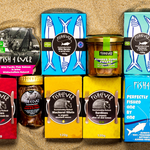You have no items in your shopping cart.
Lars Langenau, a German reporter, published this interesting and detailed article about Fish4Ever and the fishing practices in the Azores in the German magazine "Süddeutsche Zeitung". The following entry contains the translated article.
Sustainable fishing
From the sea to the table – with a clearer conscience
Why it is not only important which tuna you eat - but also how it is caught. For example, by pole and line. A local visit to the fishers of the Azores.
Not all tuna is the same, and that is why there are these very conscientious people who want to know exactly where the fish on their table actually comes from. But that's where the problem already starts. Ursula Wagner calls these people "hardcore organic" - the very strict and convinced organic consumers. "They really know what they are talking about. The processing of the product is important to them right from the start", says the Swabian.
At home in Dettenhausen near Tübingen, she runs a small health food shop, a family business called "Vitamin b", which her customers have voted "Germany's best small organic shop". That is probably why the organic farming association Naturland invited the 51-year-old to the Azores, a remote group of Portuguese islands, where Wagner visited the processing of one of the products she sells at "Vitamin b": Canned and jarred Atlantic tuna. And, of course, all in organic olive oil.
Their partner in the Azores is the small English company Fish4Ever, which is currently trying to gain a foothold in the German market and advertises that it sells "sustainable canned fish you can trust". Wagner is happy to trust, of course, but her customers want to know exactly. After all, they are "hardcore organic". So, what better than to go and see for herself how sustainable tuna fishing in the Azores is.
So welcome to the Azores, and welcome to a man who wants to do it right. First of all, can I eat tuna with a clear conscience? "Of course," says Charles Redfern. The 56-year-old is the founder and head of Fish4Ever, a company that offers pole and line caught fish. "It's only a small intrusion into natural resources", adds the agile Briton, wiping his permanently crooked reddish-blond hair over his glasses. This also virtually eliminates the by-catch of sharks, dolphins or sea turtles. "That's why I consider the catch, the local processing and the consumption of this tuna from here to be ecologically compatible."

It is mid-July when the Swabian Ursula Wagner and the British entrepreneur Redfern meet in Horta on the Azores island of Faial. The place: a fishing cooperative. They discuss, examine, look. Wagner strolls around the harbour, observes a dangerous species of jellyfish floating in the water and makes friends with a local fisherman, with whom she communicates with her hands. Next to her is Redfern, athletic, more the outdoor rather than the indoor manager type. Highly focused, curious, probing. After all, he gets his fish, which are then sold in tins and jars to Mrs Wagner in Swabia, from this cooperative.
Quite a lot of effort for a tuna, you might say. On the other hand, tuna are not organic carrots or tomatoes that can be grown in a biologically correct and sustainable way, whether in Tuscany, on a Bavarian farm or on a balcony in Berlin-Kreuzberg. The tuna issue is far more complex, starting with the fact that more than one type of tuna exists.
Just as poultry stands for chicken, duck, goose or even pigeons, the term tuna is a collective term. In addition, marine fish are one of the few products in which man has made massive use of a biotope that is billions of years old. And that went well for a long time. Our ancestors were already hunting tuna thousands of years ago. Rock paintings from the Neolithic period show them with fish traps, nets, spears, and fishing rods. They ate what they fished and fished what they needed to survive. So, Hardcore Organics have existed throughout history.
The secret of the Skipjack
In the middle of the last century, however, overexploitation began, a kind of organised industrial campaign against the tuna. After a few decades, its stocks are now so overfished that the animals can no longer reproduce as fast as they are being eaten. "My clients know a lot about the state of the sea", says Wagner, as she stands on the Azores Island of Faial on this summer day. And she looks very serious.
Of the 15 tuna species that swim across all the world's oceans, seven are hunted commercially. Just a decade ago, some species were on the brink of extinction. In the meantime, the World Conservation Organisation IUCN has removed four species from its Red List. Even the bluefin tuna, the most expensive edible fish of the world, which Ursula Wagner of course doesn't even offer at "Vitamin b".
Fish4Ever's canned products contain "skipjack tuna" the most frequently caught tuna species in the world, with a share of around 60 percent. From a strictly biological point of view, the genus is not even a real tuna. It's all marketing, just like pollock, which is not a real salmon either. But what is it then, this relative of the mackerel and tuna family?
Worldwide, it usually goes by the trade name Skipjack. Popular as a spread, on pizza, pasta or in salads. Its populations are not considered threatened, although it is also hunted mercilessly in all the world's oceans. It is sexually mature at an early age and is also extremely fertile. The skipjack tuna can live up to twelve years, weigh 20 kilos and grow over one metre long. It is recognisable by its dark blue-violet shimmering back and typical dark longitudinal stripes on its silvery belly.

The skipjack is the smallest of the commercially important tunas. Not counting illegal fishing, around six million tonnes of tuna are taken from the oceans every year. Only a little more than two per cent, or about 65,000 tonnes, end up on German plates. One of the players in this million-tonne trade: the Briton Redfern. He cooperates with Naturland, Germany's largest provider of organic food, which is also active internationally. This is not entirely unimportant, because the organic association awards its own seal to wild fish, which focuses primarily on artisanal and exemplary fisheries. Also, because it is a growing market. In the past two years of the Corona pandemic, more than five billion euros were spent on "seafood" in Germany each year.
"Naturland Wild Fish has recognised our tuna from the Azores as the first in the world to be certified", says Redfern proudly. He once made "a bit of money" as a banker, but never felt comfortable in the financial world. Then came an inheritance, enough to found a company for organically grown food more than twenty years ago. And then Fish4Ever, which today carries the main turnover of his companies.
On the cans of its fish products, the company guarantees that the contents can be traced back to the boat. A matter that also interests the trader Ursula Wagner from the Tübingen area. On that July day, she is standing in the harbour of Horta on the Faial and talks to one of the fishermen. She learns that they only fish seasonally, from March, April to September, when the shoals of these predatory fish pass by the Azores. Moreover, she learns that the 31 fishing boats of the Apasa cooperative start at dawn, the larger vessels sometimes stay at sea for up to two weeks and the smaller ones return in the evening.
"We always concentrate on one species", explains a representative of the fishermen. This is relatively simple: the shoals of one species usually stay among themselves. The fishermen at Apasa specialise in skipjack and white tuna. Even the latter is not considered threatened, at least in this part of the Atlantic. Especially not by the method used here with rod, line and hand, also called pole and line, hand line or fishing rod. Because it is a very selective method. "We sort out the small fish and never kill a whole shoal", says the man from the co-op, where Redfern buys his fish.
Redfern's fishermen do not use bait on the hook, instead they use a trick: if the fishing boat spots a school of tens of thousands of these tuna-like species it first sprays water from above. The shower on the surface of the sea simulates the movement of a shoal of sardines or smaller mackerel. Then the Portuguese toss the predators a few specimens of its favourite prey in front of their always hungry mouths. The shoal freaks out, the animals jump around wildly, the water bubbles like fish soup. In a frenzy, the skipjacks snap at the bait fish - and at the hooks on simple bamboo rods. Then the men pull one after the other out of the sea with a powerful jerk. And throw them in an arc behind them onto the deck. There they quickly suffocate. There's no time for a redemptive blow.

On Faial's neighbouring island of São Jorge, in the Santa Catarina fish factory Redfern then has his fish processed. Fish weighing about 2.5 kilos are turned into 160-gram preserves that can be kept on the shelf for at least four years. The factory employs 137 people, including 109 women. It is medium sized for Portugal, small for Europe, but the island’s largest employer.
First, the fish are boiled, which removes the water from them. Then chilled and carefully boned and filleted by hand. Then the pieces are sent into a jumble of assembly lines, at the end of which a canned version of Fish4Ever comes out. Workers receive five per cent more than the minimum wage in Portugal. They are paid for 14 months. They make the skipjack small for around 740 euros a month.

2000 tonnes of Azorean fish are canned here every year. One fish fits into six to ten cans, because only 40 percent of its mass remains at the end of the process. 6o percent, bones, head, tail, are processed into fishmeal. What all sounds so obvious and simple is a niche market. Worldwide, only four percent of the total fish catch is caught by fishing rod. In the Azores, too. Miguel Machete explains that this fishing method only became established in the Azores when US immigrants returned in the 1930s to 1960s.
The marine biologist from the independent, regional marine research institute Popa in Horta accompanies the fishery scientifically. "For 21 kilos catch" says the 46-year-old, "only one kilo of prey fish is needed at Pole and Line. Ecologically, this is a huge advantage, even over aquaculture, from which every second fish in the world now comes. This is because the production of predatory fish requires many times more feed fish. As also in the floating pens of tuna ranches, where caught bluefin tuna are fattened like cattle until they are ready for slaughter. Charles Redfern would never include their meat in his product range, he says.
Redfern now talks about the Netflix documentary "Seaspiracy", which has been running since last year, and which has stirred him up quite a bit. "Well," he says, there are shocking truths to be seen. How powerful corporations maintain death factories with massive state subsidies. How their huge fishing fleets ravage the seabed with trawl nets. How industrial fish factories use echo sounders, radar and helicopters to track down whole shoals of tuna and how drift nets as big as cathedrals threaten entire populations. Tons of sharks, dolphins and even whales get killed as by-catch. Industrial fishing is the problem, Redfern says. "It's certainly not us."
But how can you tell the difference? With a little research it is clear to any ethically aware consumer that many "sustainability" labels are worthless, says the Briton. For example, the popular dolphin-friendly US logo. "Because they don't check anything." Not even whether the tuna stocks on whose canned goods the logo is emblazoned have long been overfished. Redfern says they quickly took this logo off their cans. Redfern is now really on a roll. He has "spent years fighting in vain against what we call deliberate misinformation and green- or bluewashing". He said he was disappointed that the "other side" didn't get a word in edgewise in the Netflix film. The other side, by which he means himself and his company.
"Seaspiracy" is not balanced "but a vegan film that also ends with an advertisement for a meat substitute company.” Because, according to the radical core statement in "Seaspiracy": Don't eat fish anymore! But is that supposed to be the solution?
On the other side of the Marina da Horta, the sailboats of Atlantic crossers stop. For them, Faial is the last refuelling station before America. From here it is not quite 2,000 kilometres to the extreme tip of Canada's Newfoundland, and about 1,350 kilometres to the westernmost point of the European continent.

Because of the many blue hydrangea bushes, Faial is also called Ilha Azul, blue island. All year round, on the southern edge of the Gulf Stream, many species of whale pass by, such as the sperm whale, the pollack whale and the blue whale. Those giants were still hunted here until the mid-1980s. Today, only dolphins follow them. And tourists.
Times have changed, fortunately. And: Of course, Fish4Ever is also "a commercial enterprise", Redfern says in parting, "but one that wants to do good". In Horta's supermarket, a can of industrially caught tuna is on special offer for 49 cents. "Tuna fillets in organic olive oil" from Fish4Ever at Ursula Wagner in Dettenhausen near Tübingen cost 3.99 euros. It is the price for sustainable fishing, and probably also for a clearer conscience.
You can see the translated article in full here, further illustrated with fantastic images of our Azores trip: https://online.flipbuilder.com/exei/xtru/













